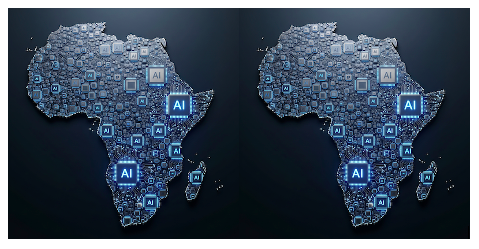Along with the rest of the world, Africa is using artificial intelligence (AI) to crunch large datasets, boost productivity, improve customer relations and even save lives.
The benefits AI is expected to bring to the world are enormous. If Africa captures just 10% of the global AI market, this would contribute a whopping $1.5-trillion (R27-trillion) to its economy by 2030, estimates multinational enterprise applications and business AI company SAP.
But to do this, African countries need to develop the requisite skills and infrastructure.
Africa is not alone in this – significant AI skills and infrastructure gaps exist even in developed economies. The United States relies on immigrant talent to sustain its AI workforce, reports the Institute for Progress, a US think tank, while the European Parliament reports that nearly half of the European Union’s population lack basic digital competencies.
Both the US and Europe face substantial AI-related infrastructure deficits, such as insufficient computing power, data centre and other network infrastructure, which is especially critical for advanced generative AI. (Generative AI is used to create content, such as text, images or code, by learning patterns from existing data.)
Fight against financial crime
The good news? South Africa is rapidly emerging as a leader in the adoption and innovation of generative AI, particularly within its insurance sector.
This sector is pushing the boundaries of generative AI, from enhancing call centres and claims processes with voice bots to executing hyper-personalised (customised and highly curated) customer engagement and sales campaigns, reports business management consultancy McKinsey.
Even better, generative AI is saving lives. In South Africa and Uganda AI-augmented portable X-ray machines have delivered faster tuberculosis test turnaround times and more accurate diagnoses.
Generative AI is improving communication in the fight against financial crime. For instance, South African digital communications company Flow Communications has developed a platform that uses AI to consolidate information on financial crimes and translate documents into four languages for the Nairobi-based organisation Tax Justice Network Africa.
The language issue
The network’s Tax and Illicit Financial Flows Knowledge Hub also uses AI to enable near-instant translation of documents uploaded to the hub, boosting access to resources, influencing policy and developing strategic partnerships.
Flow used DeepL Translator, a third-party AI service known for high-quality translations, via a custom Craft CMS plug-in built by Flow developer Zach van der Westhuizen. The plug-in reads uploaded PDF documents, detects the language and uses DeepL to translate the content into English, French, Portuguese and Arabic.
It’s estimated that Africa is home to up to 2 000 languages, so it’s not surprising that there’s a company using AI to focus on languages. Intron, based in Lagos, Nigeria, is developing the Sahara voice AI suite designed to understand over 20 African languages and diverse African accents.
Vetted by humans
While the company started out in the health sector, it is expanding its AI voice-recognition capabilities into other sectors such as finance, telecommunications and even courts.
One notable service Intron provides is AI-powered transcription for courtrooms. The Ogun State Judiciary has already adopted Intron’s speech-to-text system, which has significantly reduced the time it takes to document legal proceedings, cutting down what used to be a four-hour process to two or three hours.
AI’s uses are multifaceted, but it’s not without its pitfalls – its use needs to be carefully considered and vetted by humans. It is, after all, only as good as the information it uses, and considering that it uses the whole of the internet, that includes information that is misguided or patently wrong.
Another challenge is that generative AI often “hallucinates” if it doesn’t know the answer to a question. Because it works by predicting the most likely next word in a sentence, it makes up a plausible (or not!) answer.
Mis- and disinformation
Also, a study published by technology company Apple in June 2025 sets out generative AI’s “complete accuracy collapse” when faced with complex reasoning tasks, even when provided with explicit solution algorithms.
The Tax and Illicit Financial Flows Knowledge Hub has dealt with the accuracy and potential mis- and disinformation challenge by including a human administrator in the process. Once a document is uploaded to the hub – which can only be done by signed-up Tax Justice Network Africa members – the administrator is alerted so they can vet it. If okayed, it goes into translation, making the information available to a far wider audience.
While concerns around AI’s accuracy is, obviously, a global conundrum, the biggest hurdles in the way of Africa taking full advantage of the AI boom are skills and infrastructure.
Across the world, the pace of AI development and the scale of its adoption are creating massive opportunities for individuals and governments.
Africa’s distinct advantages include its youthful population and demonstrated capacity for technological leapfrogging, for example its enormous switch to mobile communications technology, which has completely overtaken the gap in fixed-line internet services.
Richard Frank is chief technology officer at Flow Communications, one of South Africa’s leading marketing and communications agencies. Founded in 2005 in a small spare bedroom, the company is now a multi-award-winning agency. For more information, visit www.flowsa.com. You can also follow Flow on Facebook, LinkedIn, X, or on Instagram.














